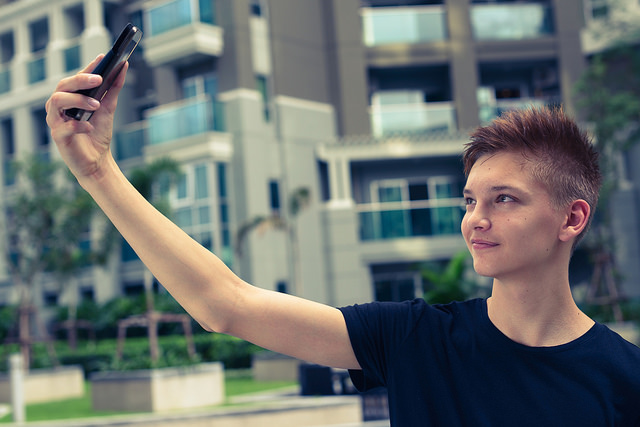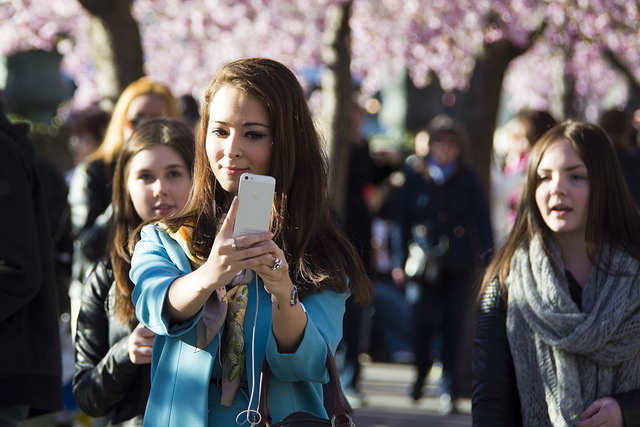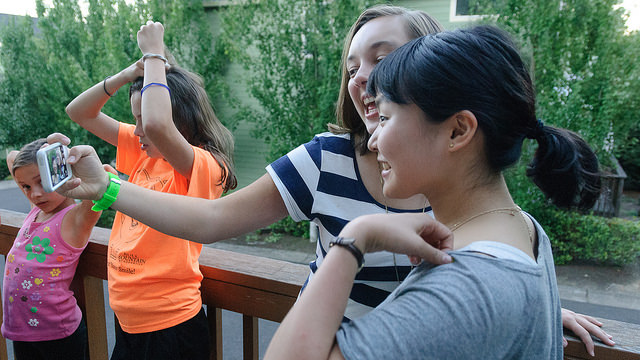What do you feel when you take selfies? Do you feel narcissist? Do you feel vain? Do you feel self-judgement? Do you quickly delete them after taking them? Do you post them? Do you view selfies as a celebration of you or criticize what you see?
Photo credit: verkeorg via Flickr / CC BY
As a mother of a teenage daughter, I observe what her friends are doing on social media. Some appear a bit obsessed with selfies. Others, rarely post at all.
In some way or another, selfies have always been around. Van Gogh painted self-portraits. In the past, turned cameras around to take a photo wasting lots of film; however, selfies were not as prevalent as they are now with smartphone technology.
What does this obsession with taking photos of oneself do?
Dr. Michelle Borba, author of UnSelfie: Why Empathetic Kids Succeed in Our All-About-Me World, explains:
Self-absorption kills empathy. Narcissism is “it’s all me.” Empathy is feeling with someone. Empathy is always “we, it’s not me.” The problem is kids are tuning into themselves, and what we need to do is flip the lens and start looking at others. We started to emphasize one side of the report card and we forgot the other side, which is “You’re also a caring human being.” Let’s redefine success so it’s not just a GPA, but it’s also a kid who has heart.((http://well.blogs.nytimes.com/2016/06/23/is-selfie-culture-making-our-kids-selfish/?em_pos=small&emc=edit_hh_20160624&nl=well&nl_art=4&nlid=48748113&ref=headline&te=1&_r=0))
I don’t think selfies are all bad. I do think we could learn a lot about self-love from selfies, but there is a line between self-love and narcissism.
Narcissism is defined by Psychology Today as:
Narcissism: Extreme self-centeredness and a grandiose view of oneself. Narcissists have an excessive need to be admired by others and have a sense of entitlement. They’re likely to agree with statements like: “I’m more capable than most people,” and “I will usually show off if I get the chance.”((https://www.psychologytoday.com/blog/close-encounters/201501/are-selfies-sign-narcissism-and-psychopathy))
Photo credit: Patrik Nygren via Flickr / CC BY
Most studies on the psychological effects of selfies focus on adults ages 18-40 years old. In studies conducted last year, it was found that women post more selfies than men, which is not surprising to any observer of social media.
What is surprising is the traits of narcissism have a stronger correlation for men that post selfies than women, but it is small.
It should be noted that all of these correlations were rather small, and as is always the case with correlational research, the existence of a significant correlation most certainly doesn’t mean that everyone who posts frequent selfies is a narcissist. In the case of this study, the correlations were rather modest. Thus, narcissism can explain only a small amount of the selfie-posting behavior that we observe on social media. There may be many other still-to-be-uncovered factors that also influence this behavior. And this study also shows that while narcissistic men are somewhat more likely to post selfies, narcissism in women, for the most part, is unrelated to selfie-posting.
This clearly means that there are likely to be other motivations for selfie-posting than simply showing off. Perhaps selfies can be a way to connect with others, especially those taken with groups or with a romantic partner. This could partially explain why women show less of an association between selfie-posting and narcissism, since women tend to be more likely than men to use social media as a way to connect with others.((https://www.psychologytoday.com/blog/close-encounters/201508/what-is-the-real-link-between-selfies-and-narcissism))
These adults did not grow up taking selfies as children. Could the results be different for those who started taking selfies as soon as they could operate a smartphone or tablet?
Photo credit: Loren Kerns via Flickr / CC BY
Some psychologists think we shouldn’t worry about the effects of selfies on teens. It is just a normal developmental stage growing up in a digital age.
Time magazine reports:
Developmentally, selfies make sense for children and teens. And for the most part, they are simply reflections of their self-exploration and nothing more. “Self captured images allow young adults and teens to express their mood states and share important experiences,” says Dr. Andrea Letamendi, a clinical psychologist and research fellow at UCLA. As tweens and teens try to form their identity, selfies serve as a way to test how they look, and therefore feel, in certain outfits, make-up, poses and places. And because they live in a digital world, self-portraits provide a way of participating and affiliating with that world.((http://healthland.time.com/2013/09/06/why-selfies-matter/))
Of course, parents need to monitor their children’s activity on social media. Selfies of inappropriate behavior or when teenagers put too much emphasis on the feedback both positive and negative they receive on social media are areas of concern. Research has found the peer influence on social media According to a study on the effects of exposure to friends’ online pictures of partying or drinking published in the Journal of Adolescent Health,
Exposure to risky online content had a direct impact on adolescents’ risk behaviors and significantly interacted with risk behaviors of their friends. These results provide evidence that friends’ online behaviors should be considered a viable source of peer influence and that increased efforts should focus on educating adolescents on the negative effects of risky online displays.((http://www.jahonline.org/article/S1054-139X(13)00366-2/abstract))
Selfies can be fun to take with a group of friends. Laughing, everyone squeezes in while the longest arm holds the camera. Don’t get me started on selfie sticks!
81% of teenagers use social media. According to the the Journal of Adolescent Health, “Adolescents often use SM to explore identity online through feedback on photos and status updates.”((http://www.jahonline.org/article/S1054-139X(14)00474-1/pdf)) Posting selfies is part of this process for some youth. Depending on the images and feedback, this action can be a part of normal development or harmful. As a parent, if my child obsesses with taking selfies, posting them, then checking for likes and comments, I would be concerned.
I may not have grown up in the selfie age, but I still remember harmful things that were said to me as a teenager criticizing my looks. In a culture that places so much emphasis on lookism, it is no wonder the selfie craze exists. We need to support our teenage sons and daughters in self-love and acceptance, with or without the selfie.



Leave a Reply